EETimes bericht dat VIA en Acer Labs in onderhandeling zijn met Intel over het verkrijgen van een P4 bus licentie voor het produceren van Pentium 4 chipsets. Volgens insiders is het niet onwaarschijnlijk dat Intel licenties afgeeft, omdat VIA en Acer Labs hiermee de mogelijkhied krijgen om DDR chipsets voor de Pentium 4 te ontwikkelen. De beperkte produktie van Rambus RIMMs zou hierdoor geen gevaar meer hoeven te vormen voor een succesvolle introductie van de Pentium 4. Intel kan zelf geen desktop chipsets met DDR support ontwikkelen omdat een lucratief dealtje met Rambus Inc. dit onmogelijk maakt:
"We don't believe there will be enough Rambus parts available, and that may hinder the Willamette launch," said Sherry Garber, memory analyst for Semico Research Corp. (Phoenix). "Intel will not sacrifice the Willamette launch in order to support Rambus, and the product just isn't there now."
That leaves Intel with the choice of licensing its new bus architecture to outside chip set vendors for use with DDR memory. They are already in the final test stages for Tehama, the Intel-designed chip set for the Willamette and RDRAM, and they have repeatedly stated that they will not design in-house a chip set for DDR memory. Indeed, Intel may be barred from supporting DDR by a 1997 deal with Rambus.
Bob Merritt, chip set analyst for Semico, said Via and ALI are the two most logical candidates to take on this task because they already produce Intel-compatible chip sets. A third possibility, Server Works, declined to comment on whether they are planning to enter that market.
VIA Pentium chipset zou de naam 'Apollo Pro 2001' krijgen. Deze naam zagen we al eerder opduiken in de Computex presentatie van VIA:
 |

